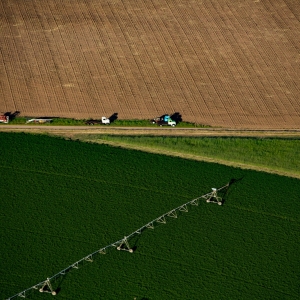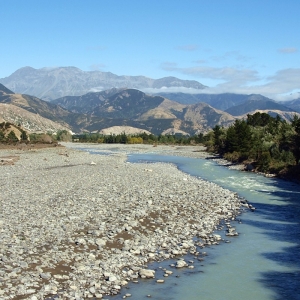Federal Water Tap, April 22: In Reversal, EPA Excludes Groundwater Pollution from Clean Water Act Permitting
The Rundown
The EPA says that all groundwater pollution is excluded from Clean Water Act permitting, even if it eventually flows into regulated waters. President Trumps signs a bill authorizing a Colorado River conservation plan, while a water rights settlement introduced in the Senate would allow more water to be withdrawn upstream in the basin, by the Navajo Nation. The GAO recommends changes to tribal consultations over federal infrastructure projects. The EPA’s environmental justice council will hold its annual meeting next week. The EPA asks for help with its water reuse plan. And lastly, the Bureau of Land Management evaluates a huge natural gas and oil development in central Wyoming.
“In February 2018, the agency sought public comment on whether the NPDES permit program applies to releases of pollutants to groundwater and whether the agency should revise or clarify its position on this issue. Informed by those comments and based on a holistic analysis of the statute, its text, structure, and legislative history, the agency concludes that the best, if not the only, reading of the [Clean Water Act] is that Congress intentionally chose to exclude all releases of pollutants to groundwater from the NPDES program, even where pollutants are conveyed to jurisdictional surface waters via groundwater.” — Interpretive note written by Matthew Leopold, EPA general counsel, and David Ross, assistant administrator for water, on whether Clean Water Act pollution permits apply to groundwater that eventually flows into rivers, lakes, and oceans.
By the Numbers
4,250: Natural gas and oil wells that would be drilled within 265,000 acres of central Wyoming as part of the Moneta Divide project. The estimated lifespan of the project — from drilling and production to remediation — is 65 years. A draft environmental impact statement for the project was published last week. (Bureau of Land Management)
News Briefs
EPA Diminishes Its Groundwater Role
In an interpretative note, U.S. Environmental Protection Agency officials concluded that the Clean Water Act does not have a role in regulating groundwater pollution.
Pollution of groundwater that eventually reaches rivers, lakes, or the ocean does not require a permit authorizing those discharges, called a NPDES permit, agency officials concluded. The opinion was written by Matthew Leopold, general counsel, and David Ross, assistant administrator for water.
The issue is a hot one, relatively speaking. The U.S. Supreme Court said earlier this year that it will hear a case this fall that involves pollution of groundwater that is hydrologically connected to regulated surface waters. Federal circuit courts have issued contradictory opinions on the question. Due to those opinions, the agency will wait until the Supreme Court issues a ruling before it applies the guidance to states that are under the Fourth and Ninth circuit court jurisdiction. Those circuit ruled that connected groundwater does require a pollution permit.
The agency’s interpretative note will be open for public comment for 45 days after it is published in the Federal Register.
Trump Signs Colorado River Plan
President Trump signed a bill that allows the federal government to implement a state-led plan to store more water in Lake Mead. The plan extends through 2026, when a current water-sharing agreement expires.
Navajo Water Rights Bill Introduced
At the same time that the Colorado River basin states are pledging to leave more water in Lake Mead, senators introduced a water rights settlement that would allow an Indian tribe to pull out more water upstream.
The bill allows the Navajo Nation to consume 81,500 acre-feet per year from Utah’s Colorado River allocation. The bill also authorizes $210 million in federal funding to build infrastructure to access the water.
The bill is sponsored by Sens. Mitt Romney (R-UT), Kyrsten Sinema (D-AZ), and Martha McSally (R-AZ).
In context: Colorado River’s Tale of Two Basins
Perchlorate to OMB
The EPA is under a court order to set a limit for perchlorate in drinking water. The agency submitted its draft proposal to the Office of Management and Budget, which will review it.
Studies and Reports
Improving Consultation with Indian Tribes
The Government Accountability Office recommends that federal agencies deepen their engagement with Indian tribes and Alaska Native corporations during the planning phase for infrastructure projects such as pipelines and highways.
The GAO also suggests that Congress clarify the National Historic Preservation Act, which requires consultation with tribes over religious and cultural values that are connected with land slated for development.
The recommendations were based on interviews with officials from 57 tribes and 21 federal agencies.
On the Radar
Environmental Justice Meeting
The National Environmental Justice Advisory Council, which advises the EPA, will hold its annual meeting from April 30 to May 2 in Bethesda, Maryland. The agenda will be available this week, but at least one item will be Superfund sites.
Air Force Officials Will Visit Oscoda, Michigan
Two Air Force officials will visit the former Wurtsmith Air Force Base and the neighboring town of Oscoda on April 24 to discuss PFAS pollution from the base.
A public Q&A will be held from 4 p.m. to 5 p.m. Eastern. It will be livestreamed.
In context: Fear and Fury in Michigan Town Where Air Force Contaminated Water
Moneta Divide Project Comment Period
The Bureau of Land Management is accepting public comments on the draft environmental impact statement for the Moneta Divide project, a large natural gas and oil development proposed for central Wyoming.
Send comments by July 18 to BLM_WY_LD_Moneta_Divide_EIS@blm.gov.
Water Reuse
The EPA is developing guidance to facilitate water recycling that it plans to release in September.
The agency seeks public input on the plan. Submit comments by July 1 via www.regulations.gov using docket number EPA-HQ-OW-2019-0174.
Federal Water Tap is a weekly digest spotting trends in U.S. government water policy. To get more water news, follow Circle of Blue on Twitter and sign up for our newsletter.
Brett writes about agriculture, energy, infrastructure, and the politics and economics of water in the United States. He also writes the Federal Water Tap, Circle of Blue’s weekly digest of U.S. government water news. He is the winner of two Society of Environmental Journalists reporting awards, one of the top honors in American environmental journalism: first place for explanatory reporting for a series on septic system pollution in the United States(2016) and third place for beat reporting in a small market (2014). He received the Sierra Club’s Distinguished Service Award in 2018. Brett lives in Seattle, where he hikes the mountains and bakes pies. Contact Brett Walton






Leave a Reply
Want to join the discussion?Feel free to contribute!